While vaccine-induced immunity may not last forever, it is not clear when a booster will be needed

The increasing prevalence of new coronavirus variants is raising questions about how well protected those who’ve already had their COVID-19 shots are against evolving forms of the SARS-CoV-2 virus. Here, microbiology and infectious disease specialist William Petri of the University of Virginia answers some common questions about COVID-19 booster shots.
1. What is a booster shot?
Boosters are an extra dose of a vaccine given to maintain vaccine-induced protection against disease. They are commonly used to bolster many vaccines because immunity can wear off over time. For example, the flu vaccine needs a booster every year, and diphtheria and tetanus vaccine every 10 years.
Boosters are often identical to the original vaccine. In some cases, however, the booster shot has been modified to enhance protection against new viral variants. The seasonal flu vaccine, most notably, requires an annual booster because the flu virus changes so rapidly.
2. Do I need to get a COVID-19 booster?
Only if you’re immunocompromised. As of August 2021, the U. S Food and Drug Administration and Centers for Disease Control and Prevention recommend adding a third shot to the normal vaccination course for people who are severely immunocompromised.
3. Why aren’t booster shots recommended for everyone yet?
While vaccine-induced immunity may not last forever, it is not clear when a booster will be needed.
Encouragingly, all of the currently authorized COVID-19 vaccines induce a robust immune memory against the coronavirus. The vaccine teaches your immune system’s memory B cells to produce antibodies when you’re exposed to the virus. Researchers have detected high levels of memory B cells in the lymph nodes of people who received the Pfizer vaccine for at least 12 weeks after they got the shot.
Studies also suggest that authorized COVID-19 vaccines are continuing to offer protection even against emerging strains of the coronavirus. Among one study’s participants, the Johnson & Johnson vaccine had 73% and 82% efficacy 14 days and 28 days post shot, respectively, at warding off severe disease from the beta variant. Another study found the Pfizer vaccine to be 88% effective against the delta variant.
No comments:
Post a Comment